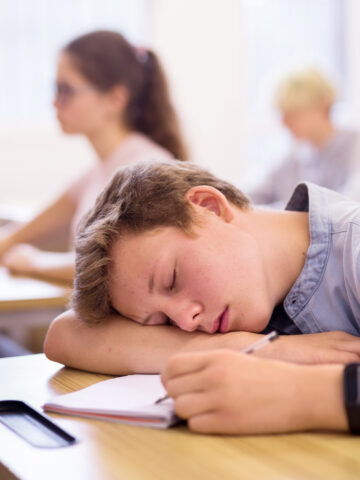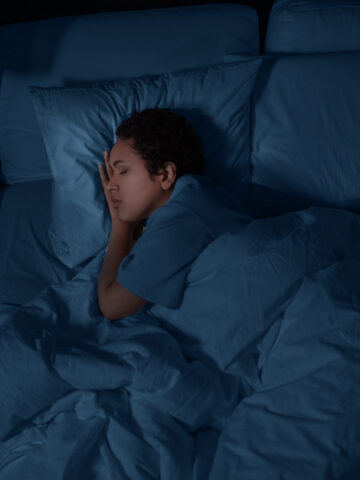Healthy sleeping habits for teens
One of the most important investments you can make in your teen’s academic success won’t cost a dime. A good night’s sleep is essential to concentration, learning, memory retention and problem-solving skills.
Despite the best intentions, students who regularly burn the midnight oil are undermining themselves. That’s because the brain needs enough hours of quality sleep to perform the essential functions related to learning.
“Studies have shown that people who are sleep-deprived have poor memory retention, and this is essentially what students are doing when they stay up past midnight cramming for a test the next day” said Dr. Neal Nakra, medical director of pediatric pulmonary at CHOC. “Deep sleep, particularly Stage III (slow-wave sleep), helps the brain solidify the learning that took place that day.”
Why a good night’s sleep is critical for high school students’ learning and memory
The average high school student needs between eight to 10 hours of sleep every night. That means lights out by 10:15 p.m. for the student who gets up around 6:45 a.m. That’s a minimum of eight hours, plus the 30 minutes needed to actually fall asleep.
But it may feel as though there are not enough hours in the day for teens balancing demanding college prep courses with a full slate of after-school activities. Dr. Nakra said he often sees chronic sleep deprivation in teens, particularly in high-achieving students.
Another common cause of poor sleep quality is the use of electronic devices right before bedtime. The light from phones, tablets, computers and electronic games actually stimulates the part of the retina that increases wakefulness.
Tips for a better night’s sleep: For teens
Dr. Nakra said the following steps will allow for a good night’s sleep without the need for medication in the vast majority of students:
- Review your teen’s academic and extracurricular schedule — is it simply too much?
- Discuss the importance of healthy sleep with your teen, and support him or her in making the tough decisions about which activities may need to be dropped.
- Set a consistent bedtime schedule, with time to relax before turning out the light.
- Remove all electronic devices from the bedroom.
- Turn off all electronics an hour or two before bedtime.
- Keep the bedroom quiet and cool, not too warm or chilly.
- Avoid caffeine or heavy meals two to three hours before bedtime.
- Be sure your teen gets daily exercise.
Daytime sleepiness, concentration difficulties and dropping grades are clear signs a teen may need more sleep. Moodiness, irritability, depression and even weight gain could also be clues.
Signs of sleep issues in school-age children: How much sleep is needed?
School-age children require between nine and 11 hours every night. Dr. Nakra added that in this age group, symptoms of hyperactivity may be related to inadequate sleep. Hyperactivity or excessive daytime sleepiness may also indicate poor sleep quality, especially if associated with other symptoms including loud snoring, mouth breathing, frequent night awakenings or bedwetting.
“These may be symptoms of sleep apnea, which is a treatable sleep disorder,” Dr. Nakra said. “Excessive daytime sleepiness also needs medical attention.”
The CHOC Sleep Disorder Center provides clinical care and testing, including sleep studies, for pediatric sleep problems. Services are available at both our Orange and Mission Viejo hospital campuses. For more information, please call 714-509-8651.
Learn more about CHOC’s Sleep Center
Get more expert health advice delivered to your inbox monthly by subscribing to the KidsHealth newsletter here.

Learn more about CHOC’s Neuroscience Institute
CHOC Hospital was named one of the nation’s best children’s hospitals by U.S. News & World Report in its 2025-26 Best Children’s Hospitals rankings and ranked in the neurology and neuroscience specialties.





